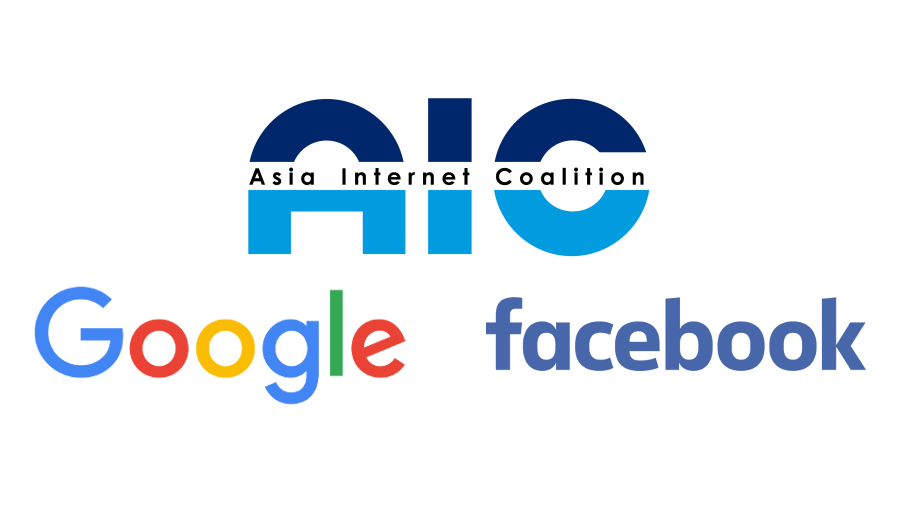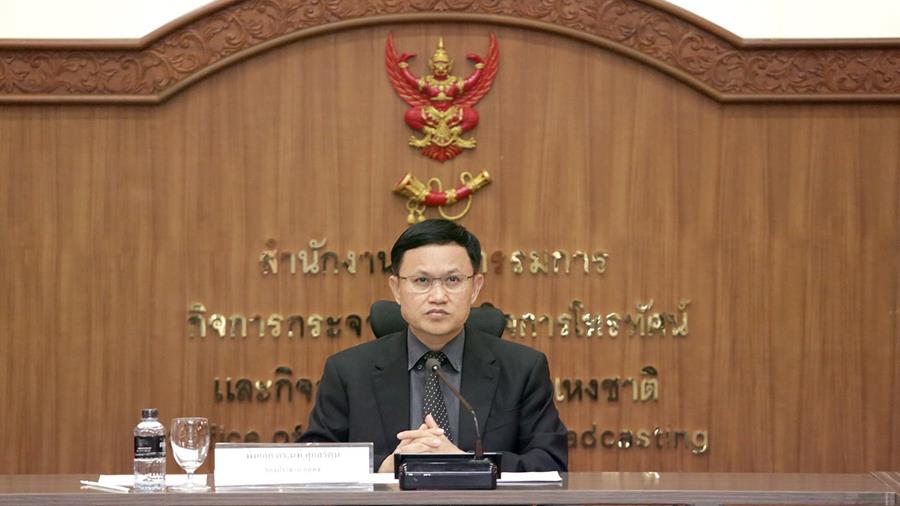เป็นประเด็นร้อนในวงการสื่อออนไลน์อยู่พอสมควร สำหรับกรณีที่ กสทช. ประกาศว่าบริษัทเอเยนซี่โฆษณา (และรวมถึงบริษัทอื่นๆ) ที่โฆษณาผ่านผู้ให้บริการแพร่ภาพและเสียงผ่านโครงข่ายอินเทอร์เน็ต (OTT หรือ Over The Top) ที่ไม่มาลงทะเบียน เข้าข่ายเป็นผู้สนับสนุนการกระทำความผิดตามประมวลกฎหมายอาญา ต้องรับโทษ 2 ใน 3 ตามความผิดที่เกิด ตาม พ.ร.บ.การประกอบกิจการกระจายเสียง กิจการโทรทัศน์ พ.ศ. 2551
เรื่องนี้เป็นที่กล่าวถึงกันมาก เพราะบริษัทยักษ์ใหญ่ที่โดนกล่าวถึงเต็มๆ คือ Google และ Facebook ที่ กสทช. บอกว่า ต้องมาลงทะเบียนภายในวันที่ 22 ก.ค. (วันสุดท้ายที่เปิดให้ลงทะเบียน) ไม่เช่นนั้น เอเยนซี่ ที่โฆษณาบนทั้ง 2 แพลตฟอร์มนี้ จะมีความผิดตามกฎหมาย

AIC ออกแถลงการณ์ค้านคำสั่ง กสทช. ระบุทำประเทศถอยหลัง
Asia Internet Coalition หรือ AIC เป็นองค์กรความร่วมมือ ที่มีสมาชิกคือ Facebook, Google, LinkedIn, Apple, Twitter รวมถึง Yahoo, LINE และ Rakuten ได้ออกแถลงการณ์ต่อกฎระเบียบที่ กสทช. ออกมาเพื่อควบคุม OTT โดย Jeff Paine กรรมการผู้จัดการของ AIC มีเนื้อหาบอกถึง ความกังวลว่าระเบียบดังกล่าวจะเป็นอุปสรรคต่อการพัฒนานวัตกรรมและธุรกิจในไทย และทำให้ประชากรไทยหลายล้านคน รวมถึงองค์กรต่างๆ ไม่สามารถใช้งานแพลตฟอร์มระดับโลก และระเบียบนี้อาจขัดต่อข้อตกลงนานาชาติได้ เนื้อหาดังนี้
We are deeply concerned that Thailand is turning its back on innovation with the NBTC’s proposed regulation of OTT services. The proposed regulations do not put Thai businesses and innovators first; they instead increase their regulatory burden and potentially limit their ability to grow. The rules could also prevent millions of Thai people and enterprises from using open global platforms to build their businesses online. We are also concerned that the rules may be at odds with Thailand’s international agreements.

พร้อมกันนี้ได้ทำหนังสือถึง พล.อ.อ.ธเรศ ปุณศรี ประธาน กสทช. มีเนื้อหาดังนี้
Chairman Thares
Office of The National Broadcasting and Telecommunications Commission
87 Phaholythin 8 (Soi Sailom),
Samsen Nai, Phayathai,
Bangkok 10400. Thailand
Dear Chairman Thares
Asia Internet Coalition’s (AIC) Response to Recently Announced OTT Regulations for Thailand
Thai consumers, businesses, and content creators are thriving in Asia and around the world, thanks to a free and open Internet. The AIC and the companies it represents are concerned that the National Broadcasting Telecommunications Commission’s (NBTC) proposal to regulate “OTT services” will adversely affect Thailand, creating business uncertainty, slowing economic growth, and limiting investments in Thailand’s growing digital sector. We are also concerned that new policies are being formulated without public consultation and these policies are at odds with Thailand’s international trade commitments and as a result will discourage investment.
The AIC welcomes constructive engagement with the Thai authorities on OTT regulation. However, the NBTC has not made and draft OTT regulations public. We have also observed press reports that the NBTC will require companies to register as OTT services within 30 days. This effectively requires parties to register to be regulated by regulations which are not in the public domain. The AIC respectfully encourages the NBTC to promptly share the draft regulation and provide a transparent public consultation process.
The NBTC has also publicly stated that companies not meeting with the NBTC will face “pressure” as they continue to operate. It has recently come to our attention that the NBTC may pressure or otherwise complicate relationships with advertisers as part of this approach. This leaves the industry in a difficult position, facing pressure to be governed by regulations which aren’t in the public domain.
Generally, the NBTC’s proposal for OTT regulation appears to uniquely disadvantage Thai consumers and content creators compared to many other countries. The proposed regulation would immediately discourage investment and inhibit growth with significant long-term negative impact on Thailand’s overall economy. It also would hinder the government’s Thailand 4.0 ambitions. The regulatory uncertainty and the perception of an unwelcome environment for digital innovators, communicators and content creators could further discourage foreign investment.
The AIC hopes the Thai Government, (including NBTC and the Ministry of Digital Economy and Society) considers the position of foreign and local OTT players in relation to Thailand’s overall competitiveness as an investment destination, and as a country providing opportunities for content creators and Small and Medium Enterprises.
The AIC would also like to highlight the following important considerations:
A) Global repercussions of the NBTC’s proposal:
• The NBTC’s present proposal makes Thailand a global outlier in regulating OTT services.
• Regulations must be consistent with Thailand’s obligations under the General Agreement on Trade in Services (GATS) in the World Trade Organization (WTO). Under GATS, Thailand committed to allowing largely unrestricted cross-border supply of “data base access services” and “on-line information . . . services”. These commitments encompass services provided by OTT service providers.
• The application of GATS to any prospective OTT regulation is complex. The best and only way for NBTC to ensure that a proposed regulation will not lead to adverse action by Thailand’s trading partners at the WTO is to introduce the draft in an open and transparent process, providing sufficient time for potentially affected parties to comment and provide feedback.
• It appears that the proposal requires OTT service providers to commit to having a taxable presence in Thailand regardless of whether they have a physical presence in Thailand. This appears inconsistent with Thailand’s international double tax treaties, and the new international consensus on (i) rules for the prevention of artificial avoidance of permanent establishment status and (ii) rules for taxing the digital economy. Thailand has recently become a member of the Inclusive Framework on BEPS,<BEPs Recommendations > which signals its commitment to adopt the BEPS recommendations.
• Imposing special tax requirements only on OTT providers creates the perception that Thailand does not follow accepted international norms, and may inadvertently impede the development of the Thai economy.
B) Immediate domestic repercussions on the Thai economy:
• On a practical level, the NBTC’s OTT framework disadvantages Thai small businesses because they are not equipped to comply with such onerous regulatory obligations.
• Regulating OTT services by way of Thailand’s broadcasting regulator may not achieve the desired outcome. Its effect would be to force these services, which are different from traditional broadcasting, into a regulatory regime not suited to the nature of OTT services. The future development of OTT services in Thailand might be stifled by the NBTC’s proposals rather than encouraged by it.
• Innumerable Thai content creators, especially those who do not currently work with traditional Thai broadcasters, will be unduly penalized for using open platforms to get their content out to wider audiences.
The AIC welcomes the opportunity to review any written proposals and recommends that the NBTC reconsider implementing the planned OTT registration and regulation.
Jeff Paine
Managing Director
Asia Internet Coalition

ทางออกยังมี จ้างเอเยนซี่โฆษณาต่างประเทศ
มีความเป็นไปได้ที่ผู้ให้บริการทั้ง 2 แพลตฟอร์มจะไม่มาลงทะเบียน เนื่องจากไม่มีเงื่อนไขที่ชัดเจน แต่เอเยนซี่ หรือผู้ ที่สนใจลงโฆษณาจะทำอย่างไร
มีการเสนอความเห็นผ่านทางโลกโซเชียลในประเด็นนี้อยู่ไม่น้อย หนึ่งในนั้นคือ การจ้างเอเยนซี่ต่างประเทศ เช่น สิงคโปร์ ให้โฆษณากลับเข้ามาในไทย ซึ่งแพลตฟอร์มทั้ง 2 ให้บริการออนไลน์ทั่วโลกไม่จำกัดพื้นที่อยู่แล้ว (เว้นแต่จะบล็อกแบบในประเทศจีน) และเงินที่จ่ายค่าโฆษณาก็ไม่ได้บันทึกในไทยอยู่แล้ว
มารอดูกันว่า เมื่อถึงวันที่ 23 ก.ค. แล้ว จะยังมีโฆษณาอะไรที่วิ่งอยู่บ้าง

สิ่งที่ยังไม่ชัดเจนของ กสทช.
เป็นปัญหาอีกประเด็นที่ยังไม่ชัดเจน เช่น การมาลงทะเบียนผู้ให้บริการ OTT กับ กสทช. จะมีผลบังคับหรือผูกพันอย่างไรบ้างในอนาคต เพราะตามนิยาม Google และ Facebook เข้าข่าย OTT แน่นอนอยู่แล้ว แต่ถ้าไม่รู้ผลกระทบ ก็ยากที่จะมาลงทะเบียน
อีกทั้งตามที่ประกาศออกมา เท่ากับว่า ถ้า Google และ Facebook ไม่มาลงทะเบียน กสทช. จะเอาผิดกับผู้ใช้บริการ (ซึ่งคือ เอเยนซี่ที่ลงโฆษณา)
นอกจากนี้ยังมีประเด็นว่า จะเข้าข่ายเป็นกิจการกระจายเสียงหรือกิจการโทรทัศน์แบบไม่ใช้คลื่น ตามมาตรา 25 ของ พ.ร.บ. นี้หรือไม่
ถ้าใช่ แปลว่าต้องมี สัดส่วนรายการและผังรายการ, การหารายได้ และบันทึกรายการที่ออกอากาศไปแล้ว ให้ กสทช. และอาจรวมถึงการทำรายการ LIVE ผ่าน Youtube, Facebook ซึ่งเรื่องนี้จะยิ่งยืดยาวไปอีกพอสมควร
ติดตามข่าวสารจาก Brand Inside ได้จาก Facebook ของเรา

